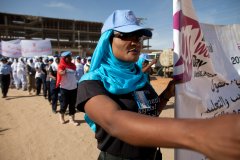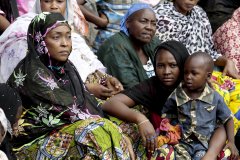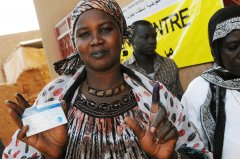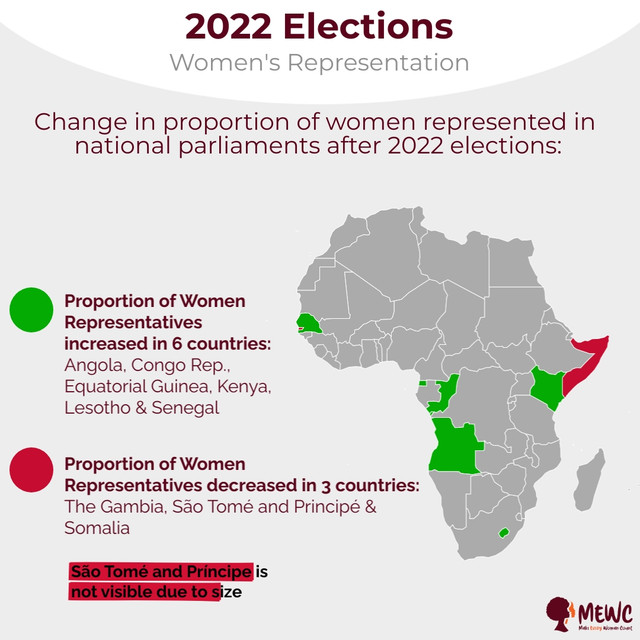Gender Issues Showlist
Women, Peace & Security
UNSCR 1325 calls on all parties to: protect and respect the rights of women and girls in conflict & post-conflict; increase women participation in all conflict resolution, peacekeeping and peace-building & to end impunity by prosecuting perpetrators of sexual and other violence on women and girls
index.php?option=com_content&view=category&id=56&Itemid=1913
Human Rights of Women
Thirty six years after the adoption of CEDAW, many women and girls still do not have equal opportunities to realize rights recognized by law. Women are denied the right to own property or inherit land. They face social exclusion, “honor killings”, FGM, trafficking, restricted mobility, early marriage,...
index.php?option=com_content&view=category&id=44&Itemid=1908
Violence Against Women
Violence against women is the most shameful human rights violation. Gender based violence not only violates human rights, but also hampers productivity, reduces human capital and undermines economic growth. It is estimated that up to 70 per cent of women experience violence in their lifetime
index.php?option=com_content&view=category&id=69&Itemid=1912
Political Participation & Leadership
Where women are fully represented, societies are more peaceful and stable. Women political participation is fundamental for gender equality and their representation in positions of leadership must be a priority for all Africans governments.
index.php?option=com_content&view=category&id=65&Itemid=1911
Latest News
- Chad: Parliamentary Elections 2024
- Namibia: General Elections 2024
- Mozambique: Parliamentary and Presidential Elections 2024
- Tunisia: Presidential Elections 2024
- MEWC is looking for Research & Communications Interns
- COTE D'IVOIRE: South-South Meeting to Promote Gender Equality and Combat Deforestation
- RWANDA: Rwanda Set to Launch Cervical Cancer Elimination Plan
- NIGERIA: Over 5,000 Nigerian Women Stranded in Iraq - Govt
- SUDAN: Healthcare Collapse Threatens Pregnant Women in Sudan's Sharg El Nil
- GHANA: President Nominates 12 More Ministers
AFRICA: Cultivating Resilience: Women's Leadership in Biodiversity Conservation
Aicha would not describe her profession as farming, and yet she is coaxing life out of a barren desert. The first thing she does each morning is feed the sheep and chickens dried alfalfa that she has grown, giving a bit of extra food to one ram that she is preparing for Eid al-Adha, the feast of sacrifice. She then makes her family a breakfast of eggs, bread and dates, sourced from their plot of land and from women in her village. Returning to the backyard, Aicha then assesses what work needs to be done to continue cultivating these resources for her family.
Living in the Drâa-Tafilalet region of Morocco on the cusp of the Sahara, water is a valuable resource. A common expression is aman iman or “water is life” in Tashelhit, the Indigenous language of the region. Until recently, water spilled forth from the local terwa, a community-managed network of wells and trenches delivering water from the nearby Atlas Mountains. Due to an ongoing drought, Aicha carefully dispenses water from a plastic canister, which her son gathers from faraway sources, to hand irrigate green shoots of scallions, beets and turnips peeking through the hardened soil. On other days, she harvests alfalfa with a sickle or collects ripe dates from towering palms. Her work is often interrupted by customers for her business as a seamstress. Flowy cotton dresses are in demand, and perfect for the many tasks that women, like Aicha herself, undertake daily.
Similar to many women around the world, Aicha’s knowledge of how to sustainably care for and benefit from nature could fill books. Biodiversity underpins her life, and sustains the health and well-being of her family and village. However, on a global scale, women often have less access and control over land, natural resources and other productive assets, and receive fewer related benefits, including inclusion in policy making processes. Therefore, women’s input and knowledge are often not considered during the development of biodiversity policies. Yet, efforts to safeguard nature and its benefits to society are falling short, and need to include the knowledge and leadership of women, as their roles and responsibilities often put them in direct contact with nature.
The Kunming-Montreal Global Biodiversity Framework aims to help overcome this central challenge. Adopted by all 196 Parties to the Convention on Biological Diversity (CBD) at the end of 2022, the framework supports a global transformation in society’s relationship with biodiversity by preserving and protecting nature and its essential services to people.
Targets 22 and 23 of the Framework call for the representation and participation of women in decision-making related to biodiversity, and for gender equality in its implementation, which are supported by an accompanying 2022-2030 Gender Plan of Action. National Biodiversity Strategies and Action Plans (NBSAPs), the primary policy mechanisms to implement the CBD at the national level, are now being updated and revised to reflect these advancements in global biodiversity policy. A gender-responsive approach can lead to biodiversity policies that are more responsive to the lived experiences and knowledge of men and women, and are championed and implemented across all of society, regardless of gender.
The UNDP publication “Gender Equality, Women’s Empowerment, and Leadership in National Biodiversity Planning, Monitoring, and Reporting" provides seven entry points for mainstreaming gender into national biodiversity planning, monitoring and reporting during this revision process. For example, governments can undertake a gender analysis to understand the relationships between men and women, their access to resources, and their activities in a given country or region. Then, they can take steps to enhance underlying economic, social and political conditions and promote women’s knowledge, participation and leadership.
Case studies, from the Gökova Bay in south-east Türkiye to dry tropical forests in Colombia, illuminate how these entry points can also be applied for gender-responsive small-scale conservation and sustainable development projects. The publication also seeks to shed light on trends in the capacities of countries to mainstream gender during the development of national biodiversity reporting systems related to CBD to help guide national-level actions toward pursuing gender equality.
Women like Aicha are a link between generations of knowledge on the care and keeping of this planet and a more sustainable future. Women like her benefit from a policy environment that favors activities that build and strengthen their capacity, increases their access to resources and opportunities, and supports their leadership and effective participation in decision-making processes. These interventions also have positive impacts on the community, food security and biodiversity. Gender-responsive NBSAPs can help to improve the actions governments are taking to halt biodiversity loss and repair our relationship with nature, and ensure that women are key agents of change and empowered to contribute alongside men as leaders.





